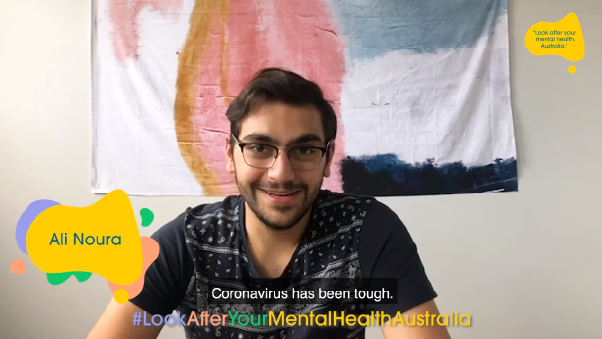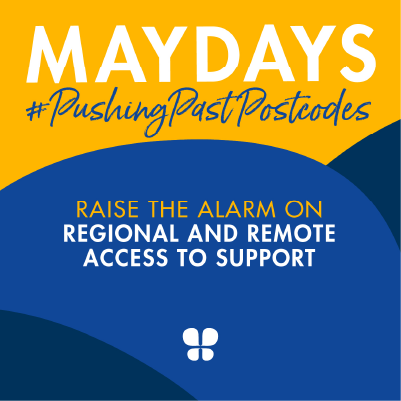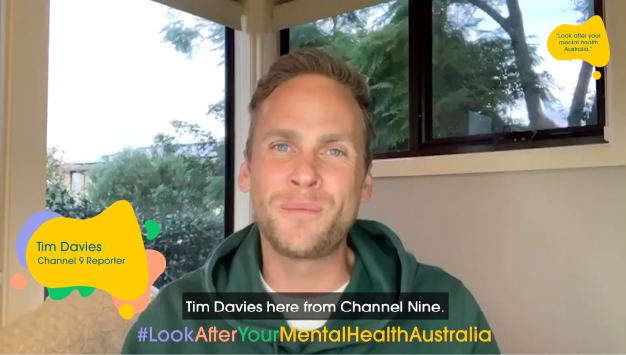Time to reflect and respect
Over the last four weeks I’ve thoroughly enjoyed speaking with more than 60 passionate and professional members of our mental health sector. Meeting and hearing from staff, members, stakeholders and colleagues has certainly given me a better understanding of our sector, and that process will continue over the coming weeks as I talk with more and more people.
Above all it has been a lovely way to start to get to know everyone or renew connections, albeit via zoom or on the phone. One thing has been clear from the outset: our sector has some fantastic people working really hard advocating for reform and improved service access and delivery.
As I’ve connected, listened, and talked through some of the challenges and opportunities for mental health, I’ve found we have a highly engaged sector with many voices of expertise and experience.
I’ve heard we sometimes need to balance those voices, especially when they seem to be competing voices, as well as harness the strength and power of people with lived experience.
I’ve heard Mental Health Australia needs to keep adding our expertise to policy debate and discussion, as well as look to the future and where we sit strategically as an organisation. This includes what we should do, but just as importantly, what we shouldn’t.
This is an exciting area for me, and something we’ve already started to discuss at Board level, as we look ahead to our next strategic plan and where our advocacy efforts can be best targeted over the next few years.
This year the bushfires, followed by COVID-19, have presented our mental health community with a further opportunity to galvanize, and also a time for states, territories and the federal Government to work together, as we saw last week with the National Cabinet unanimously supporting the National Mental Health and Wellbeing Pandemic Response Plan.
But, as I’ve also been reminded a number of times in recent weeks, we must remember we are certainly not starting from scratch. Despite ongoing challenges and gaps experienced by people every day, a lot of good work has gone before us, for decades, not just years or months.
On top of this, the Fifth Plan has been in place for some time, the Productivity Commission Inquiry into Mental Health will be released shortly, and we are still awaiting recommendations from the Royal Commission into Victoria’s Mental Health System.
How our previous experiences, reports and recommendations intertwine and influence the next generation of ideas and thinking is also a good example of what makes our sector complex and nuanced in so many ways.
Having listened so much in this first month, I’ve realised more and more just how complex our sector is, but more importantly how we all need to reflect on, and respect the complexities of what we are all trying to achieve.
Respect them by not clambering all over each other through desperation or conflict. Use the opportunities and challenges that arise to focus on what could improve and unite the sector, rather than divide it.
Clearly it is early days for me in this role, and I’m still looking forward to talking to more and more of our mental health community over the coming weeks and months. In saying that, I’m equally keen to start taking what I am hearing and turning it into action our mental health community can get behind, and action that will benefit the Australian community at large.
Warm regards
Leanne Beagley
CEO
National Cabinet meeting marks historic day for mental health in Australia
Mental Health Australia has welcomed last Friday’s National Cabinet meeting focus on the increase of mental illness and anxiety in the community as result of COVID-19, and the opportunity to discuss the National Mental Health Commission’s National Mental Health and Wellbeing Pandemic Response Plan.
Read more
New NDIA Mental Health Working Group
Mental Health Australia is working with the NDIA and Department of Social Services on a time limited, Mental Health Working Group - Stakeholder Reference Group (MHWG SRG) that has been established by the Department of Social Services to provide advice to the Senior Officials Working Group (SOWG) Mental Health Working Group (MHWG) on implementing the recommendations of the Disability Reform Council (DRC) on psychosocial disability. The MHWG, Chaired by Sam Bennett from the NDIA and Harry Lovelock from Mental Health Australia as Deputy Chair, has consumer and carer representation from state jurisdictions, peak psychosocial service provider groups and specialist psychiatric advice that will provide advice to the SOWG MHWG on the design and implementation of strategies to:
- Improve access to the NDIS by people with a severe mental illness and significant, enduring psychosocial disability
- Link and refer people with a psychosocial disability who have been assessed as not eligible for the NDIS to alternative supports
- Strengthen the interface between the NDIS and the mental health service system.
- Introduce a recovery-oriented approach to the NDIS through the development of a Psychosocial Disability Recovery Framework and introduction of a Psychosocial Recovery Coach support item.
At its 9 October 2019 meeting, the Disability Reform Council (DRC) agreed to an approach to improve the access and experience of participants with psychosocial disability in the National Disability Insurance Scheme (NDIS) and to improve linkages and referrals to mainstream mental health services and other supports for people who do not meet the access criteria for the NDIS.
The Council’s deliberations emphasised the importance of improving the interface between the NDIS and clinical mental health systems through a range of strategies. These strategies include a coordinated approach to care, information sharing and concurrent supports. The DRC also welcomed the establishment of a Psychosocial Disability Recovery Framework with a strong focus on recovery and supporting people with episodic needs.
Embrace Multicultural Mental Health News
|
|
The Framework for Mental Health in Multicultural Australia (the Framework) is a free, nationally available online resource which allows organisations and individual practitioners to evaluate and enhance their cultural responsiveness. It has been mapped against national standards to help you meet your existing requirements, with access to a wide range of support and resources.
We are pleased to invite you to the second of a four-part webinar series in June 2020. The webinar will provide an in-depth look into Module 2 of the Framework: Developing Safe, Quality & Culturally Responsive Services.
Details:
- When: Wednesday 3 June 2020
- VIC, NSW, ACT, TAS & QLD: 2:00 pm
- SA & NT: 1:30 pm
- WA: 12:00 pm
Register here
Embrace Consumers and Carers join “Look after your mental health, Australia” campaign
Some members of our CALD Mental Health Consumer and Carer Group have been sharing mental health advice as part of the Mental Health Australia Look after your mental health, Australia campaign, encouraging all Australians to prioritise mental health at this time. Watch below for Ali’s tips, and check out our Instagram, Facebook and Twitter channels for more!

|

|
$48.1 million for National Mental Health and Wellbeing Pandemic Response Plan
Minister for Health, Greg Hunt, says the Australian Government is continuing to take action to help Australians whose mental health and wellbeing is being affected by the COVID-19 pandemic by providing an additional $48.1 million to support the Mental Health and Wellbeing Pandemic Response Plan presented to the National Cabinet last week.
Read more
Thousands of young people are seeking help for loneliness during COVID-19
New data shows a 50 per cent spike in the number of people seeking help from ReachOut’s digital youth mental health service to deal with loneliness during the COVID-19 pandemic compared to the same time last year.
Read more
Rural Health Journal shines a light on physical and mental health
What impact do bushfires, COVID-19 and climate change have on rural health? These are some of the questions asked by guest editors Martin Jones, David Mills and Richard Gray in the latest issue of the Australian Journal of Rural Health, which is available now.
Read more
Expert: COVID-19 - Mental health and suicide modelling
Professor Jayashri Kulkarni, Psychiatrist and Professor, Monash Alfred Psychiatry research centre (MAPrc). Professor Kulkarni, along with researchers from the Monash Alfred Psychiatry research centre (MAPrc) are currently conducting a nationwide survey tracking the mental health effects on Australians of the COVID-19 pandemic.
Read more
Funding to support carers of people with mental illness during the pandemic appreciated
Carers Australia have welcomed the Government’s announcement last Friday that $3.5 million will be available to support family and friend mental health carers under the National Mental Health and Wellbeing Pandemic Response Plan.
Read more
Have the COVID-19 workplace changed affected people’s mental health?
New research launched this week in response to COVID-19 reveals that recent workplace changes have had a major impact on Australia’s mental health.
Read more
Gayaa Dhuwi (Proud Spirit) Australia - two new wellbeing and mental health posters released
Gayaa Dhuwi (Proud Spirit) Australia, the new national Indigenous wellbeing, mental health and suicide prevention leadership body, this week launched two additional wellbeing and mental health support posters for Indigenous Australians for staying healthy and strong during the coronavirus outbreak.
Read more
|
|
|
|
Next week I am looking forward to calling more of our Members and stakeholders to introduce myself and learn more about their work and the sector at large.
On Tuesday, the Mental Health Australia Governance Committee will meet via webinar, and the Mental Health Australia team is looking forward to participating in an online Introduction to Cultural Competency training session.
On Thursday, Melanie Cantwell, Deputy CEO and I will be meeting with the Productivity Commission via webinar. Following that Harry Lovelock, Director of Policy and Projects and I will be participating in the next National Peak Bodies Bushfire Recovery Coordinators Forum via teleconference.
On Friday, I will be participating in a National Initial Assessment and Referral project EAG meeting with the Australian Psychological Society.
|
|
|

The Psychotherapy and Counselling Federation of Australia (PACFA) is a national peak body for counsellors and psychotherapists and for professional associations in the counselling and psychotherapy field in Australia. Their mission is to represent the profession to communities and government, and to develop the evidence-base relating to the art and practice of counselling and psychotherapy. PACFA promotes the development of the practice of counselling and psychotherapy, and respects and supports the diversity of approaches within the profession. PACFA provides a united forum for counsellors and psychotherapists, and for counselling and psychotherapy associations, to foster professional identity for practitioners, support research and training, and ensure public accountability to consumers, the public and government.
Website - www.pacfa.org.au Facebook - www.facebook.com/Psychotherapy-and-Counselling-Fed… Twitter – www.twitter.com/PACFOZ

Anglicare Tasmania is a non-profit organisation providing a wide range of community services to the people of Tasmania. They are part of the national Anglicare Australia network of organisations. Anglicare advocates for social justice and aids people in times of need. They provide programs relating to health, accommodation, families, substance abuse and more. Anglicare have branch offices, group activities, individual carers and safe gathering spaces throughout Tasmania. Over the years they’ve provided essential help and services to many Tasmanians, and they are consistently monitoring current and future needs.
Website - www.anglicare-tas.org.au Facebook - www.facebook.com/AnglicareTas
|
|
New nationwide network of Carer Gateway service providers now operating
A new nationwide network of Carer Gateway service providers are delivering a range of support services to Australia’s 2.65 million unpaid carers. Services include counselling, online coaching, emergency and planned respite, peer support and financial support packages. The new service providers will have shopfronts, service outlets and a flexible workforce to ensure that carers have access to supports and services no matter where they live.
Carer Gateway aims to support carers through any daily challenges, and emotional and financial stresses that they may experience in their role as a carer. Services are free to access for anyone looking after a family member or friend with disability, a medical condition, a mental health condition or who is frail due to age. The new service delivery model is the second stage of the Australian Government’s $700 million reform of carer services.
For more information or advice on the supports and services available, click here or call 1800 422 737 Monday to Friday between 8am and 5pm local time.
Read more
Caring Fairly COVID-19 survey responses
The Caring Fairly Coalition has just released the results of the COVID-19 carer survey. There was a huge amount of responses from carers across Australia. The results confirm that unpaid carers are being significantly impacted by the COVID-19 outbreak, across all areas of their lives. Many carers are spending more time on care, are facing higher living costs and are experiencing much more stress in their roles as carers.
Read the results
Have your say on Australia’s draft National Injury Prevention Strategy
The Australian Government is committed to developing a National Injury Prevention Strategy. This commitment was in recognition of the ongoing and substantial burden of injury, and following expiration of the previous National Injury Prevention and Safety Promotion Action Plan (2004-2014).
The Strategy includes focus on injury across federal and state jurisdictions related to health, transport, justice, planning and urban development, education, and emergency services and as such identifies possible lead and partner agencies for each Action Area.
In order to proceed on schedule with the development of the Strategy, we ask that feedback is submitted by COB Friday June 19, 2020.
Read more
Information for Disability Support Pension and Carer Payment recipients in response to COVID-19
A document has been developed to answer any questions that Disability Support Pension and Carer Payment recipients may have around the COVID-19 pandemic.
Read more
MHCC: How can you help people in your community living with mental health challenges?
Join MHCC for the final webinar as they launch the final learning materials, ‘Good Practice Guide and Final Report’ and celebrate the lived experience co-design of the project and its learning opportunities. The learning opportunities are important in the COVID-19 environment where we are expecting an increase in people looking for help that have mental health challenges.
The webinar will:
- Describe the learning materials developed by the CEEP Project
- Encourage the use of the learning materials by people nationally (including launch of the ‘Good Practice Guide and Final Report’)
- Celebrate the lived experience co-design of the learning materials/opportunities.
FREE Webinar: June 10, 10.30am-11.30am AEST

Read more
Young, Willing and Able: Youth Survey Disability Report 2019 released
There were 25,000 young people aged between 15 and 19 who participated in Youth Survey 2019, and of those, 1,623 were young people with a disability. This report focuses on young people with disability compared with young people who did not have a disability in the Youth Survey 2019.
Read more
Butterfly Foundation MAYDAYS 2020 campaign launched
Butterfly is proud to launch its MAYDAYS 2020 campaign #PushingPastPostcodes to highlight the daily battle for treatment and support of more than 280,000 Australians living with an eating disorder in regional, remote, and very remote (RRR) communities. MAYDAYS for eating disorders is Butterfly’s annual awareness, fundraising and advocacy campaign which takes place nationally in May. Each year, our campaign draws on the experiences of Australians to highlight key concerns relating to eating disorders and calls for change.

Read more
Apply for your FREE psychosocial learning places now!
Applications for Mental Health Victoria’s free Psychosocial Learning Hub places are now open! Limited places are open to Victorian support workers and support coordinators that currently provide supports to NDIS participants with psychosocial disability, and their supervisors. Any worker, supervisor or organisation can apply, including sole traders. Complete the application form on this link (3-5 minutes). The mobile micro-learning program will run from 13 July 2020 to 12 March 2021 for supervisors, and from 10 August 2020 to 12 March 2021 for workers. Applications close on 1 June 2020.
Read more
Webinar: What will it take for all Aboriginal and Torres Strait Islander children to live vibrant, joyful lives?
This webinar is presented by Richard Weston, CEO of the Secretariat for National Aboriginal and Islander Child Care (SNAICC). Richard Weston will discuss SNAICC’s work in policy development and advocacy to help more Aboriginal and Torres Strait Islander Children to have happy, healthy childhoods that set them up to have the best opportunity for a good life.
Read more
|
|
|
Channel Nine’s Tim Davies with some tips to
“look after your mental health, Australia”

|










